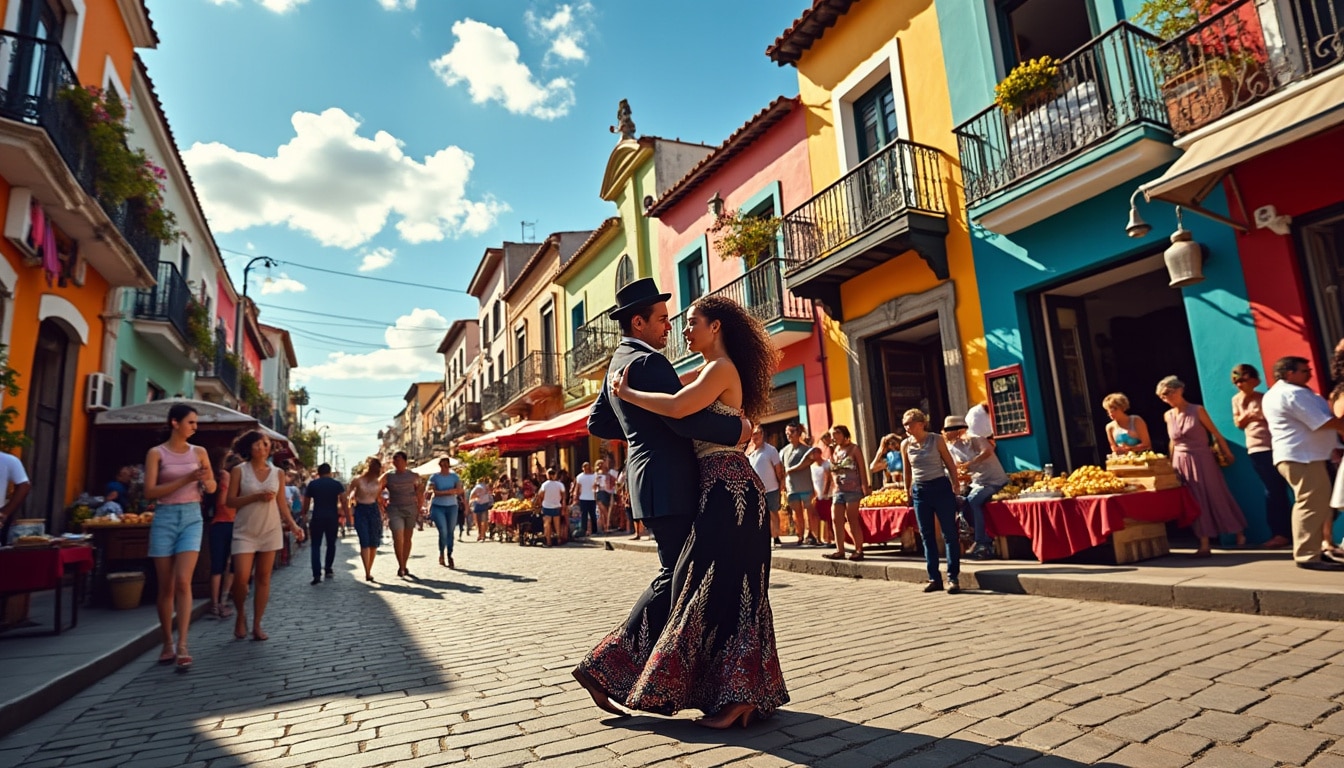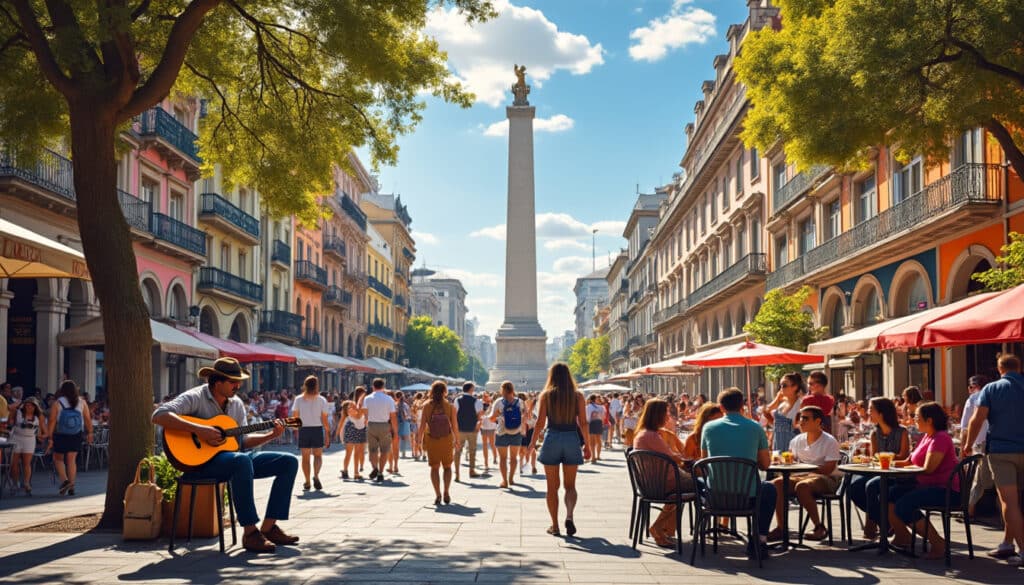Buenos Aires, the vibrant capital of Argentina, is a city of inspiring contrasts and bustling energy. Famous for its rich cultural heritage and dynamic street life, it attracts travelers from all over the world. With its European flair and Latin American heartbeat, Buenos Aires offers an unparalleled experience filled with remarkable landmarks, tantalizing cuisine, and unparalleled artistic expression. From the pulsating beats of tango to the allure of historic neighborhoods, Buenos Aires is a place where tradition and modernity beautifully intertwine.
The Historical and Cultural Significance of Buenos Aires
Nestled on the shore of the Río de la Plata, Buenos Aires has served as a vital cultural and political hub in South America. As the capital of Argentina, it remains one of the continent’s most prominent cities, known for its deep-rooted history that dates back centuries.
Initially founded in 1536 by Spanish explorer Pedro de Mendoza, Buenos Aires has undergone numerous transformations throughout its history. The city officially gained the title of the Autonomous City of Buenos Aires in 1994, reflecting its special status as an independent district not belonging to the Buenos Aires Province. The significance of this autonomy is reflected in its governance and urban planning, highlighting the city’s prominent role in national and regional affairs.
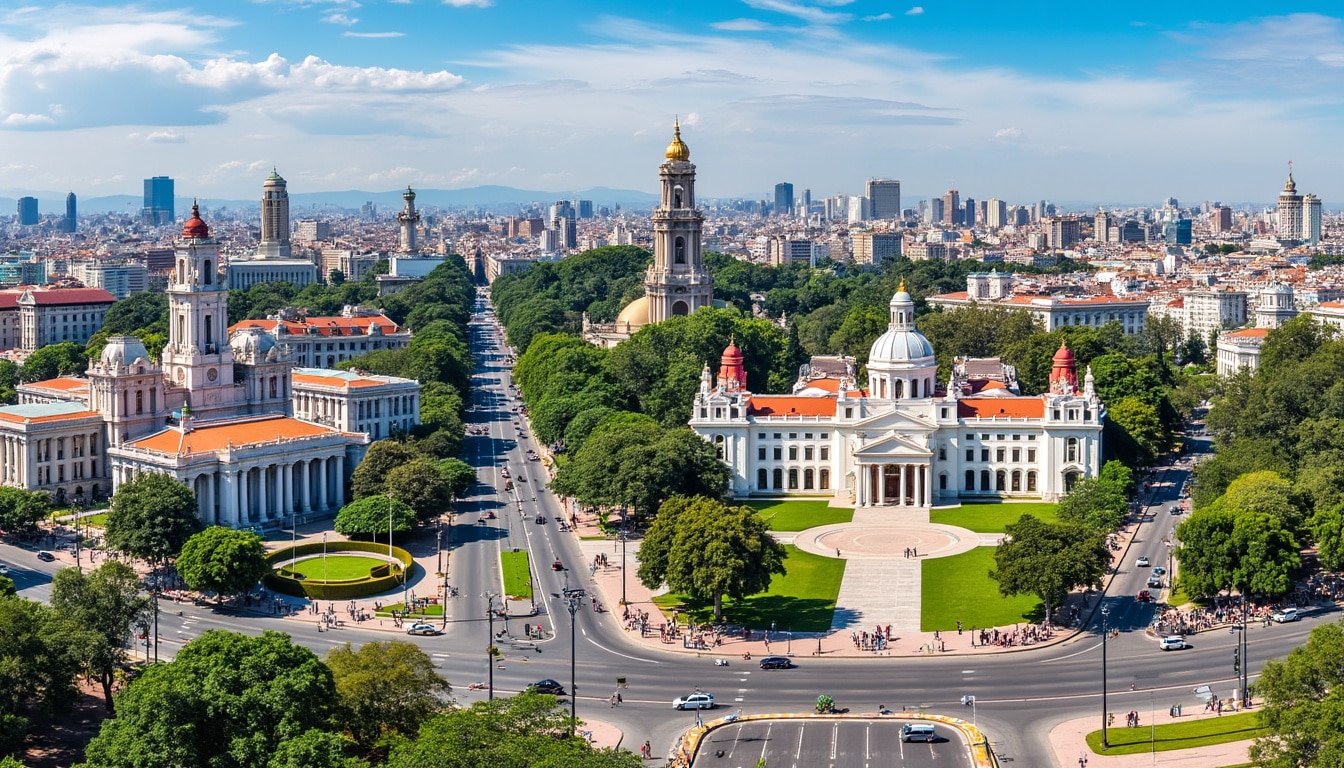
As an alpha city—a term that highlights major global cities with high economic activity and cultural influence—Buenos Aires stands alongside Sao Paulo and Mexico City as vital players in Latin America’s urban landscape. Its historical neighborhoods, such as San Telmo, are rich in character and charm. Visitors flock to the San Telmo Market, where antiques, local crafts, and tango shows create a lively atmosphere. This area beckons with cobblestone streets lined with Colonial buildings, offering a glimpse into the past amidst modern life.
Buenos Aires has also earned the nickname “Paris of South America” due to its European-style architecture and fashionable streets. Stroll through its avenues, and you’ll encounter grand boulevards reminiscent of Parisian charm, showcasing the enduring legacy of a city that loves to blend the old and the new. The city’s Art Nouveau and Art Deco buildings provide a visual feast for architecture enthusiasts, prompting cultural explorers to lose themselves in urban beauty.
The city’s rich cultural fabric is best experienced in its vibrant events. Buenos Aires has hosted many significant events, including the 1978 FIFA World Cup and the Pan American Games. The forthcoming summer youth Olympics of 2028 will once again put Buenos Aires in the global spotlight, celebrating its commitment to international harmony through sports.
From its architectural marvels to its role as a center of cultural festivals and events, Buenos Aires weaves the stories of its past with the bustling energy of today. Visitors and locals alike feel the city’s spirit, a true reflection of its historical and cultural significance that continues to inspire future generations.
The Diverse Neighborhoods and Vibrant Streets of Buenos Aires
Buenos Aires is a city of distinctive neighborhoods, each offering its unique texture, flavor, and allure. Known for its diversity, the city lets visitors explore various atmospheres, from the bustling business districts to serene, leafy residential areas.
La Boca, with its colorful streets and iconic murals, is perhaps one of the most recognized neighborhoods. Its vibrant palette and quirky atmosphere have made it a frequent subject of photographers and culture enthusiasts alike. This area is also famed for Boca Juniors, one of Argentina’s top football clubs, drawing die-hard fans who fill the stadium with passionate cheers and colors.
In contrast, Recoleta is a serene area known for its French-inspired elegance and stately mansions. A walk through the UNESCO-listed Recoleta Cemetery is both intriguing and humbling. This unique cemetery, a labyrinth of ornate tombs and mausoleums, is the resting place of notable figures like Eva Perón. The grandeur of the cemetery turns it into a must-see attraction that leaves a lasting impression on every visitor.
Puerto Madero, the ultramodern waterfront neighborhood, exemplifies the city’s progressive spirit. It reflects Buenos Aires’ commitment to modernization with its sleek skyscrapers juxtaposed against historic docks. Here, upscale dining options showcase Argentine beef in world-class settings, epitomizing the culinary excellence Buenos Aires is celebrated for. A walk along the waterfront at sunset unveils unparalleled views of both the gleaming skyline and reflections on the water.
The energetic atmosphere of Palermo showcases an urban playground where both day and night bring diverse experiences. Urban parks, street art, eclectic boutiques, and trendy eateries make it a hub of creativity and youth culture. The buzzing Palermo Soho district is especially renowned for its vibrant nightlife, offering a perfect backdrop for spontaneous adventures.
The diverse neighborhoods in Buenos Aires create a harmonious blend of old-world charm and contemporary urban living. Whether it’s the historic allure of San Telmo or the avant-garde beauty of Puerto Madero, each bairro narrates its own story, inviting visitors to discover every facet of this dynamic city.
Dining and Gastronomy in Buenos Aires
Buenos Aires is nothing short of a culinary paradise. Eating is a joyous ritual here, one that reflects both the city’s varied cultural influences and its love for gathering. Argentina’s capital is synonymous with Argentine beef, celebrated globally for its exceptional quality and taste. Visitors cannot leave without enjoying an authentic parrilla experience—a traditional Argentine grill that offers tender cuts of succulent beef, often paired with Argentina’s famous chimichurri sauce.
For those looking to venture beyond beef, Buenos Aires offers a delightful array of gastronomic delights. The city’s iconic empanadas, stuffed pastries filled with savory fillings like beef, chicken, or cheese, make for a perfect snack at any time of the day. Additionally, Buenos Aires is renowned for its unique pizza style, thick crust with a generous topping of cheese and delicious sauces.
The customary drink in Buenos Aires is Mate, a traditional South American tea. Drinking mate is a social activity, often shared among family and friends, reflecting the city’s communal spirit. Enjoying mate is as much about the ritual as it is about the beverage itself, and locals will always share its intricate customs with curiosity-driven visitors.
For those with a sweet tooth, Buenos Aires offers irresistible desserts like dulce de leche, a caramel-like spread, and alfajores, delicate cookies filled with the creamy confection.
The dining culture here extends beyond what’s on the plate; it’s woven into the social fabric, making every meal a cultural experience. Local eateries and cafes tell stories of community and tradition, often through gatherings around late-night dinners or leisurely Sunday brunches—a reflection of life at a different rhythm than the typical hurried pace of city living.
- 🥩 Experience the perfection of Argentine beef at a local parrilla.
- 🥟 Try an assortment of empanadas, a staple of Argentine street food.
- 🍕 Savor Buenos Aires’ unique style of cheesy, rich pizza.
- ☕ Share mate with locals and learn about its social rituals.
- 🍬 Indulge in dulce de leche delights and alfajores for dessert.
The Art and Expression Through Tango and Street Art
Of all the artistic endeavors that flourish in Buenos Aires, tango holds a special place in the city’s heart. Emerging in the late 19th century in working-class neighborhoods, tango has grown from its humble beginnings in brothels to become both a national symbol and an internationally admired dance form. It portrays raw passion and profound emotion, allowing dancers to communicate beyond words through music and movement.
Tango is not only a dance; it is a way of life here. Many dance halls and milongas thrive in the city, offering tourists and locals a chance to experience this celebrated dance in its traditional setting. Visitors are welcome to join tango classes, absorbing the dance’s graceful steps and emotive power, breathing life to every performance.
The artistic landscape of Buenos Aires extends far beyond tango. A thriving street art scene captivates onlookers with vibrant murals and political expressions that make the city streets come alive with color and commentary. The city is recognized as a global hotspot for murals, encouraging artists to transform empty walls and public spaces into canvases of protest, celebration, and introspection. With street art tours available, visitors can gain insights into the stories behind these artworks, understanding the social and political contexts that influence them.
Buenos Aires’ creative spirit is further manifest in venues like the Teatro Colón, widely considered one of the world’s most beautiful opera houses. This iconic theater proudly hosts world-class performances, delivering unforgettable cultural experiences to every visitor. Although rooted in cultural history, Buenos Aires continues to innovate and inspire through avant-garde artistry, driven by a city that appreciates both tradition and modernity.
- 🕺 Immerse in the emotive rhythms of tango at local milongas.
- 🎨 Discover the city’s colorful street art and its profound messages.
- 🎭 Experience world-class performances at the historic Teatro Colón.
Sports, Entertainment, and Modern Living in Buenos Aires
Sport is an integral part of Buenos Aires’ identity, with soccer playing a central role in the community. Home to renowned football clubs like Boca Juniors, the city vibrates with energy on match days. The passion that fuels soccer fans here is palpable, making attending a live game an electrifying experience for sports enthusiasts and casual observers alike.
Apart from soccer, Buenos Aires welcomes various sports and recreational activities that cater to all interests and ages. Green spaces like Palermo Parks provide urban retreats where jogging, cycling, and relaxing by the lakeside are common pastimes. The modern lifestyle of Buenos Aires offers accessible fitness centers and yoga studios, reflecting the city’s commitment to health and well-being.
Beyond sports, the entertainment scene thrives with options both indoors and out. Whether exploring indie cinemas, participating in local arts festivals, or enjoying concerts under the stars, Buenos Aires offers endless opportunities for recreation. Nightclubs and bars in vibrant areas like Palermo and Puerto Madero keep the city buzzing into the early hours, providing a backdrop for social connections and lasting memories.
Sustainable living has become a priority, with initiatives that encourage eco-friendly practices woven into daily life. Recycling programs and urban gardens continue to expand, emphasizing the importance of reducing the environmental impact while promoting a community-focused approach to modern living.
| Activity | Location | Highlights |
|---|---|---|
| ⚽ Soccer Matches | Boca Juniors Stadium | Passionate fan atmosphere |
| 🏃♂️ Outdoor Activities | Palermo Parks | Jogging, cycling, relaxation |
| 🎬 Entertainment | Puerto Madero | Nightlife, bars, and clubs |
| 🌿 Sustainable Living | Rooftop Gardens | Urban gardening initiatives |
Buenos Aires’ robust blend of sports, entertainment, and commitment to sustainable living presents a modern metropolis that pulses with an adventurous and environmentally conscious community. Through both energetic engagements and leisurely pursuits, Buenos Aires thrives as both an exciting and responsible city eager to welcome the future.
FAQ about Buenos Aires
Q: What is the best time to visit Buenos Aires?
A: The best times to visit Buenos Aires are from March to May and September to November, when the weather is pleasant and crowds are smaller.
Q: What are some must-try dishes in Buenos Aires?
A: Don’t miss experiencing Argentine beef at a local parrilla, sampling empanadas, savoring pizza, and sharing mate with locals.
Q: How is the cultural life in Buenos Aires?
A: Buenos Aires boasts a vibrant cultural scene with tango shows, street art, theater performances, and lively festivals celebrating local and international culture.
Q: What activities can families enjoy in the city?
A: Families can enjoy outdoor activities in Palermo Parks, visit museums, take street art tours, and explore the dynamic neighborhoods.
Q: Is Buenos Aires safe for tourists?
A: While Buenos Aires is generally safe for tourists, it’s advisable to stay vigilant, especially in crowded areas, and follow local guidance for a secure and enjoyable visit.

Fun Facts & Curiosities About Buenos Aires
Buenos Aires, the heart and soul of Argentina, is not just a city, but an experience. Known for its vibrant culture, architectural marvels, and passionate tango, Buenos Aires offers surprising facts and curiosities that even frequent visitors may find fascinating.…
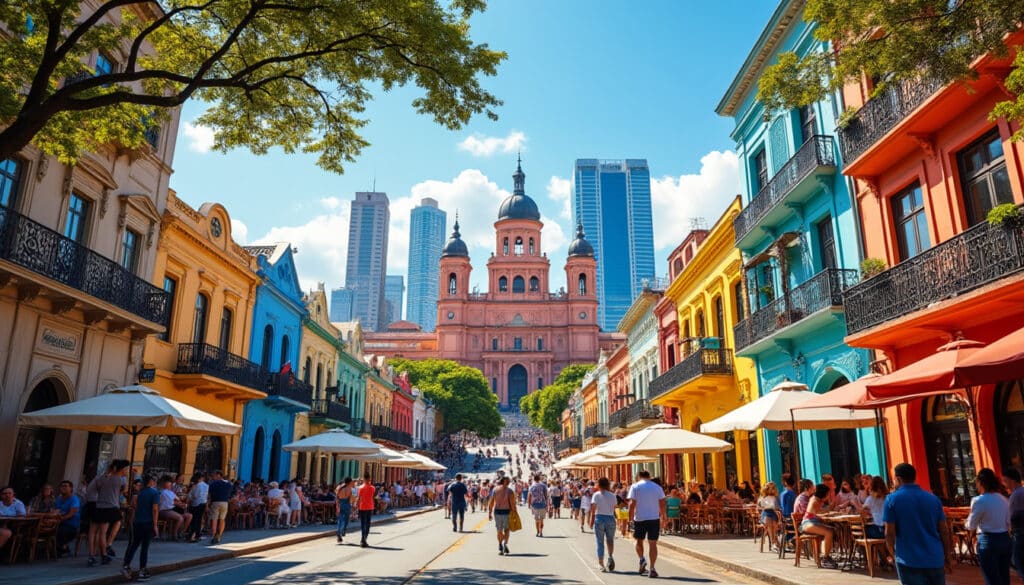
Architecture and urban features of Buenos Aires
Buenos Aires is renowned for its captivating architectural diversity, a melting pot of styles that reflect its rich cultural heritage. Known as both “The queen of the Río de la Plata” and “Latin America’s Paris,” the city’s landscape is a…
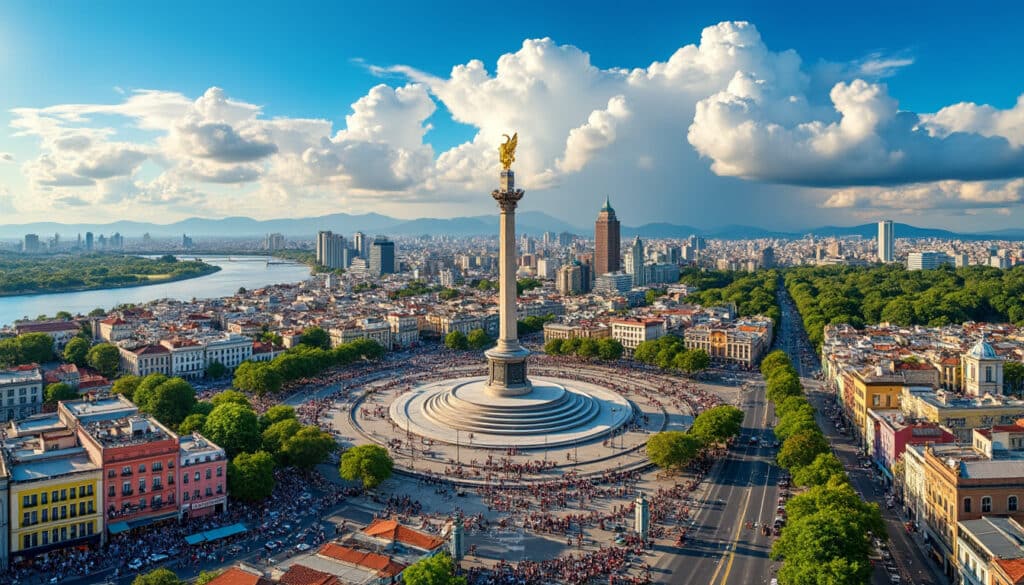
Demographics and geography of Buenos Aires
Buenos Aires, a city pulsating with energy, stands as one of the most influential urban landscapes in Latin America. Known for its captivating blend of European flair and Latin American warmth, Buenos Aires is rich in cultural diversity and historical…
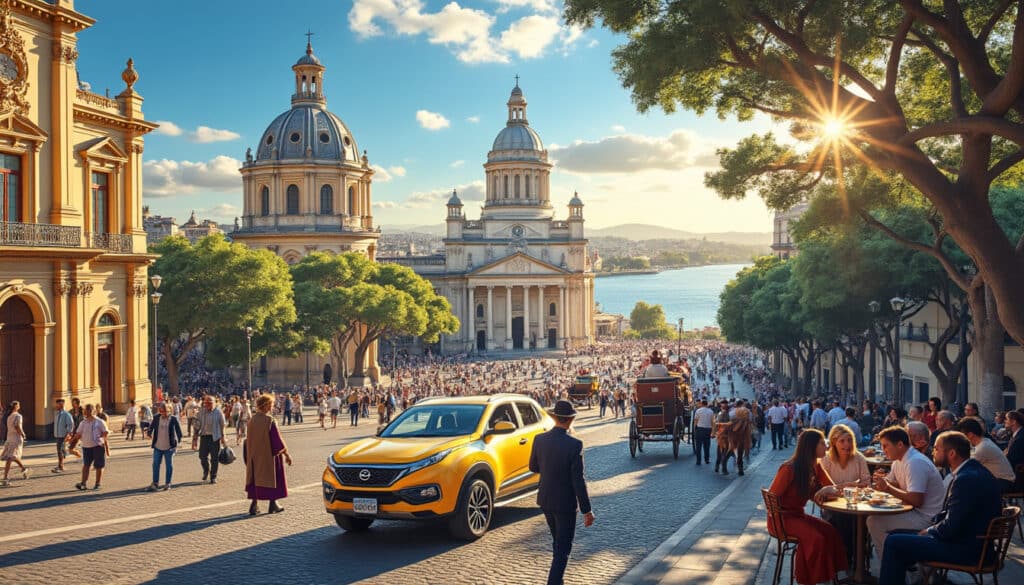
Buenos Aires, often regarded as the “Paris of South America”, carries a rich tapestry of history woven through its vibrant streets and iconic landmarks. From its roots as a colonial outpost to its current status as a bustling metropolis, Buenos…
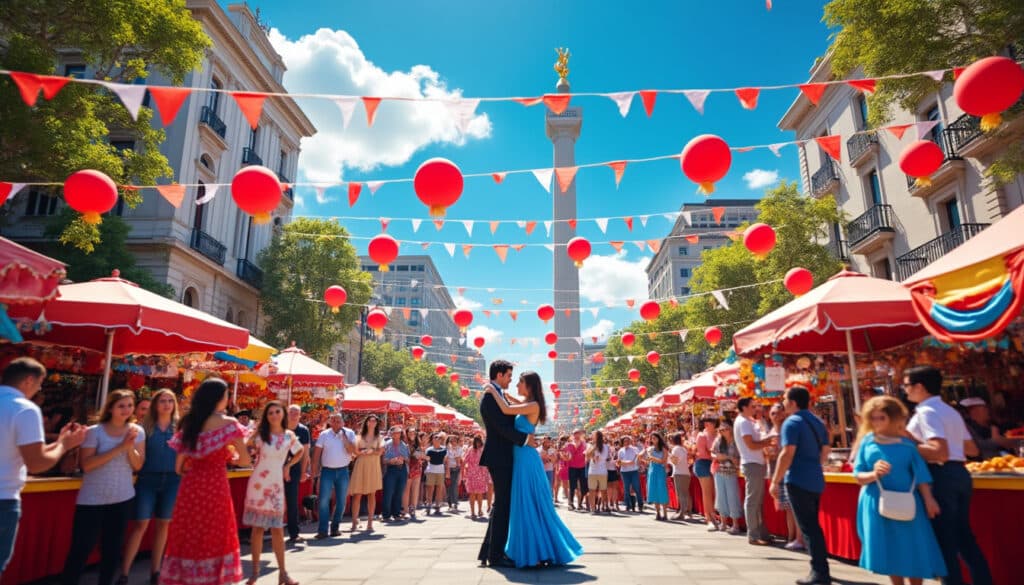
Holidays and celebrations in Buenos Aires
Buenos Aires, the enchanting capital of Argentina, is a city that thrives on celebrations, cultural diversity, and vibrant festivals. Its festive calendar is brimming with events that capture the essence of its rich history and multifaceted identity. From the iconic…

Language and spelling of Buenos Aires
Buenos Aires, often celebrated as the “Paris of South America,” stands as the vibrant capital of Argentina, rich in cultural diversity and linguistic variety. Known for its dynamic blend of European elegance and Latin American flair, Buenos Aires captivates millions…
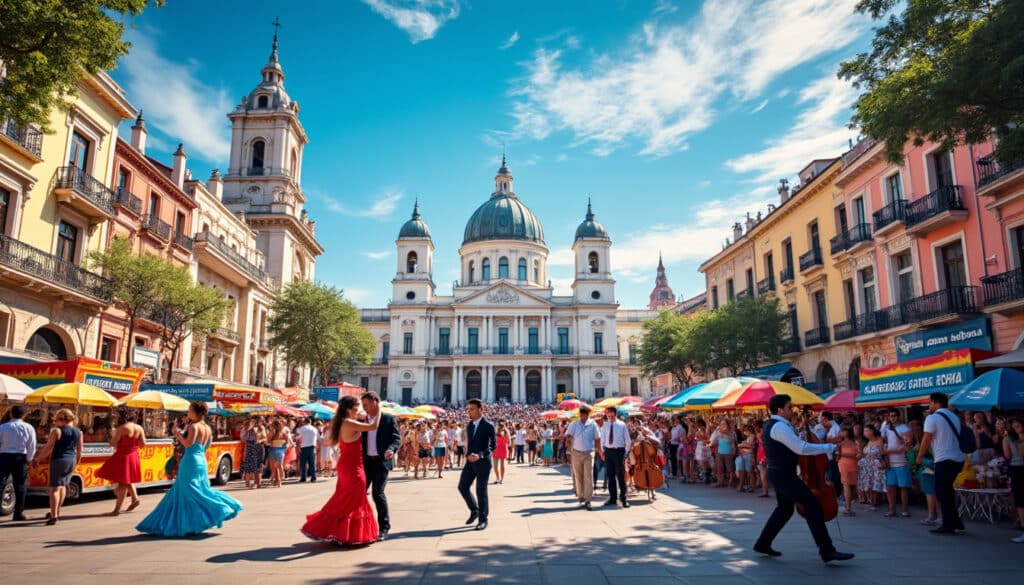
Local tips for tourists in Buenos Aires
Embark on an unforgettable journey through the vibrant streets of Buenos Aires, a city that seamlessly blends rich history with modern charm. For tourists visiting Buenos Aires, these insider tips will help you navigate the city’s hidden gems, culinary adventures,…
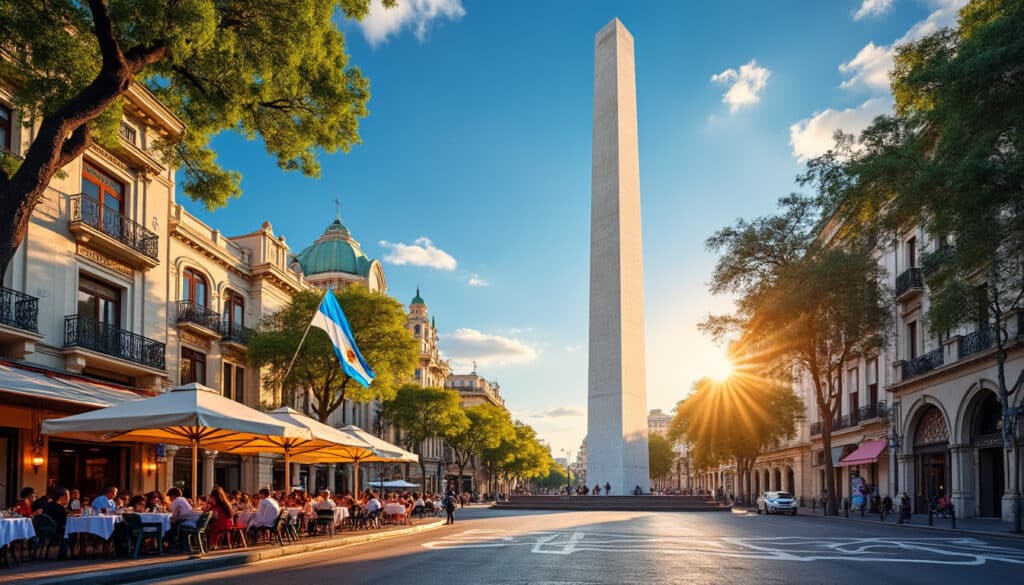
Names, flags, and identity of Buenos Aires
Buenos Aires, often dubbed the “Paris of the South,” is a city where history, culture, and identity intertwine in a dynamic tapestry. Beyond its vibrant streets, alive with the rhythm of tango and the aroma of mate, the identity of…
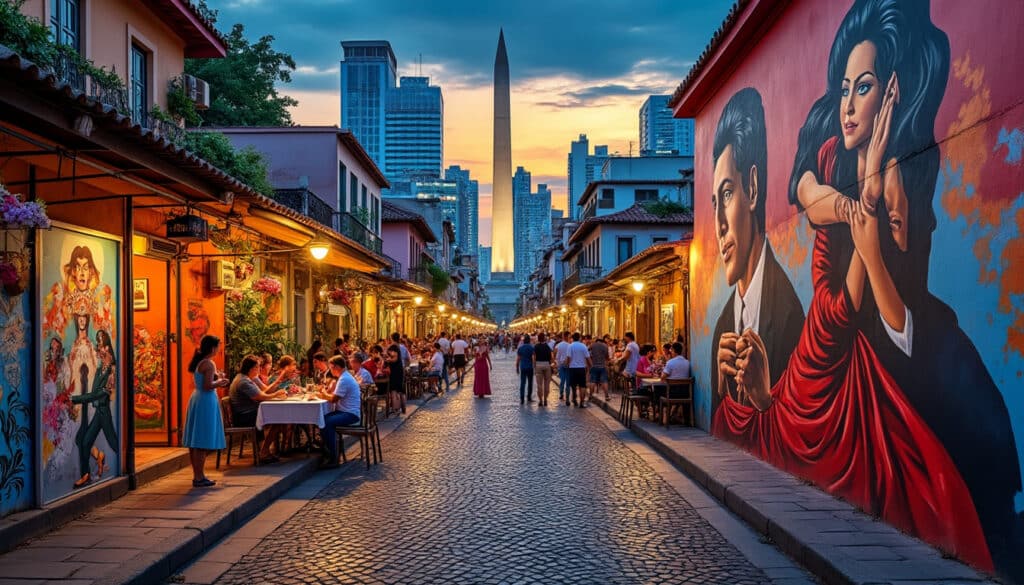
Reputation and identity of Buenos Aires
Buenos Aires, the capital of Argentina, stands as a testament to the rich history and cultural diversity that flow through its vibrant streets. Recognized for its European charm coupled with Latin American flair, the city offers a unique blend of…
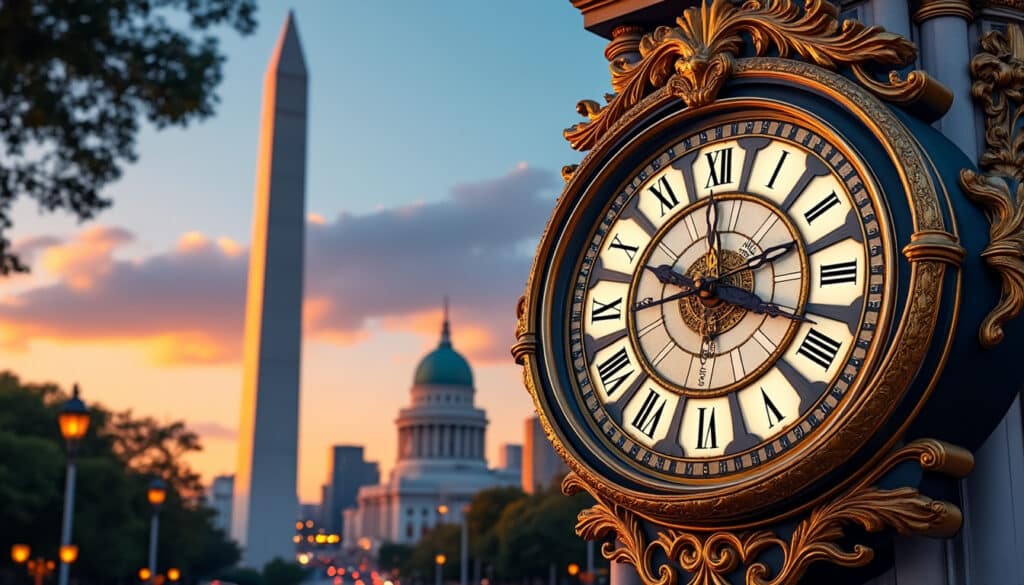
Time and time zone in Buenos Aires
Experience the vibrant ebb and flow of Buenos Aires, where time seems to waltz to the city’s unique rhythm. Understanding Buenos Aires Time is more than just setting your watch; it’s about immersing oneself into the heart of Argentina Time,…
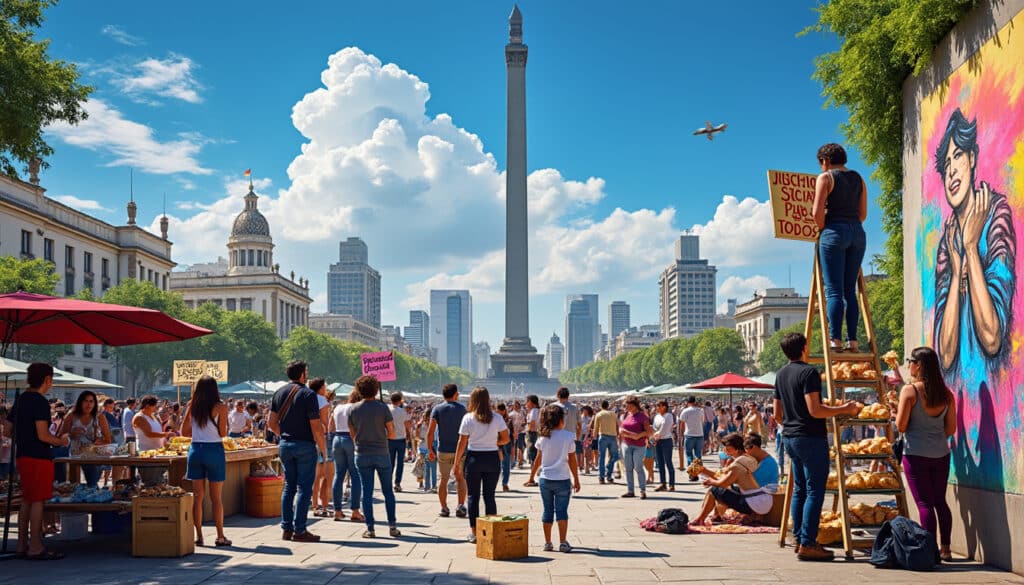
Unusual facts and social issues in Buenos Aires
Buenos Aires, with its captivating blend of old-world charm and dynamic modernity, captivates visitors and residents alike with many intriguing facets and pressing social issues. Behind the tango rhythms and lively street art lies a tapestry of unique cultural characteristics…
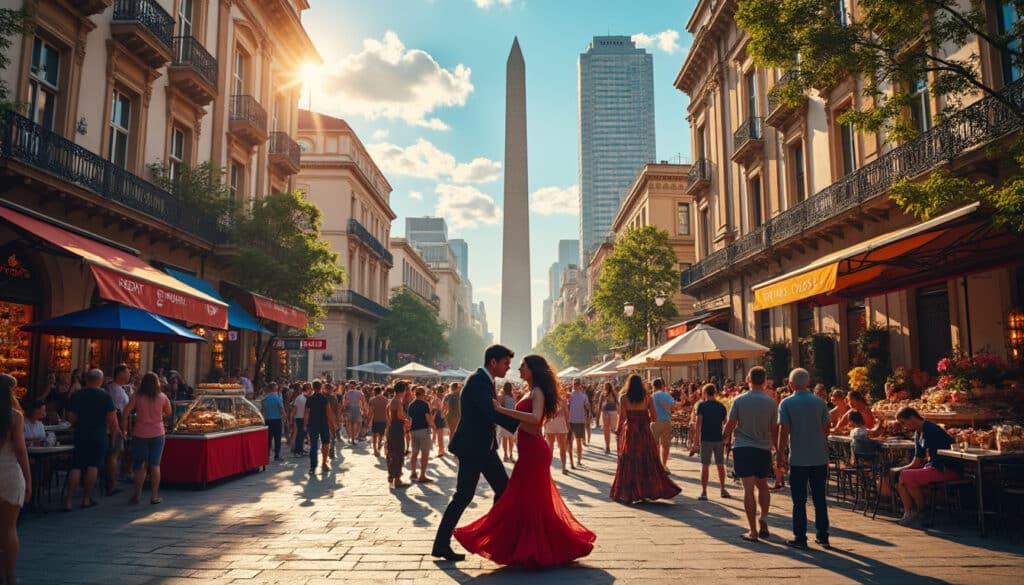
What does Buenos Aires look, smell, feel like?
Welcome to a city that dances even when you walk, a place where the rhythm never stops, and the sensation never fades. Buenos Aires, aptly known as the “Paris of South America,” invites you to explore its streets filled with…

